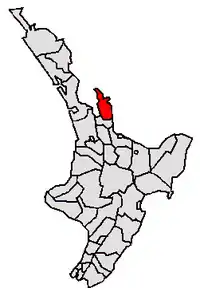Thames-Coromandel District | |
|---|---|
 The road northwards from Thames. Somewhere south of Te Mata. | |
 | |
| Coordinates: 36°56′31″S 175°40′34″E / 36.942°S 175.676°E | |
| Country | New Zealand |
| Region | Waikato |
| Wards | Coromandel-Colville Mercury Bay South Eastern Thames |
| Formed | 1975 |
| Seat | Thames |
| Government | |
| • Mayor | Len Salt |
| • Territorial authority | Thames-Coromandel District Council |
| Area | |
| • Land | 2,207.96 km2 (852.50 sq mi) |
| Population (June 2023)[2] | |
| • Total | 33,700 |
| Time zone | UTC+12 (NZST) |
| • Summer (DST) | UTC+13 (NZDT) |
| Postcode(s) | |
| Website | Thames-Coromandel District Council |
The Thames-Coromandel District is a territorial authority district in the North Island of New Zealand, covering all the Coromandel Peninsula and extending south to Hikutaia.
It is administered by the Thames-Coromandel District Council, which has its seat in the town of Thames. It was the first district council to be formed in New Zealand, being constituted in 1975. The district lies within the Waikato Regional Council area. Its only land boundary is with Hauraki District.
Demographics
The district had a population of 33,700 in June 2023.[2] 7,630 live in Thames, 6,440 in Whitianga, 4,500 in Whangamatā, and 1,930 in Coromandel.
Thames-Coromandel District covers 2,207.96 km2 (852.50 sq mi)[1] and had an estimated population of 33,700 as of June 2023,[2] with a population density of 15.3 people per km2.
| Year | Pop. | ±% p.a. |
|---|---|---|
| 2006 | 25,938 | — |
| 2013 | 26,178 | +0.13% |
| 2018 | 29,895 | +2.69% |
| Source: [3] | ||
Thames-Coromandel District had a population of 29,895 at the 2018 New Zealand census, an increase of 3,717 people (14.2%) since the 2013 census, and an increase of 3,957 people (15.3%) since the 2006 census. There were 12,471 households, comprising 14,625 males and 15,273 females, giving a sex ratio of 0.96 males per female. The median age was 53.6 years (compared with 37.4 years nationally), with 4,488 people (15.0%) aged under 15 years, 3,537 (11.8%) aged 15 to 29, 12,600 (42.1%) aged 30 to 64, and 9,273 (31.0%) aged 65 or older.
Ethnicities were 87.9% European/Pākehā, 18.3% Māori, 2.1% Pacific peoples, 3.4% Asian, and 1.7% other ethnicities. People may identify with more than one ethnicity.
The percentage of people born overseas was 16.4, compared with 27.1% nationally.
Although some people chose not to answer the census's question about religious affiliation, 54.4% had no religion, 33.0% were Christian, 1.0% had Māori religious beliefs, 0.6% were Hindu, 0.2% were Muslim, 0.9% were Buddhist and 2.0% had other religions.
Of those at least 15 years old, 3,591 (14.1%) people had a bachelor's or higher degree, and 5,874 (23.1%) people had no formal qualifications. The median income was $24,900, compared with $31,800 nationally. 2,622 people (10.3%) earned over $70,000 compared to 17.2% nationally. The employment status of those at least 15 was that 9,414 (37.1%) people were employed full-time, 4,359 (17.2%) were part-time, and 633 (2.5%) were unemployed.[3]
| Name | Area (km2) | Population | Density (per km2) | Households | Median age | Median income |
|---|---|---|---|---|---|---|
| Coromandel-Colville Ward | 559.60 | 3,228 | 5.77 | 1,296 | 52.4 years | $23,000 |
| Mercury Bay Ward | 709.66 | 8,799 | 12.40 | 3,591 | 52.2 years | $26,300 |
| Thames Ward | 473.26 | 10,647 | 22.50 | 4,371 | 52.5 years | $24,300 |
| South Eastern Ward | 464.56 | 7,224 | 15.55 | 3,216 | 57.9 years | $26,000 |
| New Zealand | 37.4 years | $31,800 |
Local government
The Thames-Coromandel District Council was formed from the amalgamation of the Thames Borough, Thames County and Coromandel County councils in 1975,[4] and is led by the Mayor of Thames-Coromandel.
History
In 1923, the constituent counties included -[5]
| area | population | gravel roads | mud roads | tracks | |
|---|---|---|---|---|---|
| Coromandel County | 440 sq mi (1,100 km2) | 2,120 | 42 mi (68 km) | 74 mi (119 km) | 189 mi (304 km) |
| Thames County | 413 sq mi (1,070 km2) | 5,373 | 52 mi (84 km) | 26 mi (42 km) | 155 mi (249 km) |
| Thames Borough | 3,670 acres (14.9 km2)[6] | 4,765[7] | |||
| Totals | 2,185 km2 (844 sq mi) | 12,258 |
References
- 1 2 "ArcGIS Web Application". statsnz.maps.arcgis.com. Retrieved 28 February 2022.
- 1 2 3 "Subnational population estimates (RC, SA2), by age and sex, at 30 June 1996-2023 (2023 boundaries)". Statistics New Zealand. Retrieved 25 October 2023. (regional councils); "Subnational population estimates (TA, SA2), by age and sex, at 30 June 1996-2023 (2023 boundaries)". Statistics New Zealand. Retrieved 25 October 2023. (territorial authorities); "Subnational population estimates (urban rural), by age and sex, at 30 June 1996-2023 (2023 boundaries)". Statistics New Zealand. Retrieved 25 October 2023. (urban areas)
- 1 2 "Statistical area 1 dataset for 2018 Census". Statistics New Zealand. March 2020. Thames-Coromandel District (011). 2018 Census place summary: Thames-Coromandel District
- ↑ Monin, Paul (14 April 2016). "Hauraki–Coromandel region - Government and politics". Te Ara – the Encyclopedia of New Zealand. Retrieved 10 July 2019.
- ↑ "KAWHIA SETTLER AND RAGLAN ADVERTISER Main Highways - Conference at Hamilton". paperspast.natlib.govt.nz. 3 August 1923. Retrieved 16 October 2021.
- ↑ "Thames Valley Power Board. TE AROHA NEWS". paperspast.natlib.govt.nz. 6 July 1922. Retrieved 16 October 2021.
- ↑ "Official Year Book 1921-22".
External links
 Media related to Thames-Coromandel District at Wikimedia Commons
Media related to Thames-Coromandel District at Wikimedia Commons Coromandel Peninsula travel guide from Wikivoyage
Coromandel Peninsula travel guide from Wikivoyage